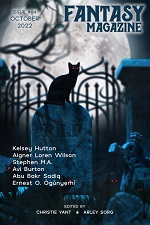“Short Swims From Great Heights” by Stephen M.A.
“Queen of the Wilis” by Kelsey Hutton
“Quantum Eurydice” by Avi Burton
“The Black and White” by Aigner Loren Wilson
Reviewed by Victoria Silverwolf
All the stories in this issue are quite short, from seven hundred words to less than three thousand. Readers can enjoy quick escapes from reality during lunch breaks or any other brief respites they may have from their busy lives.
“Short Swims From Great Heights” by Stephen M.A. is a surreal, satiric tale in which fish are an oppressed minority, blamed for crime and attacked by ichthyophobic bigots. The human protagonist is a liberal lawyer who tries to defend the rights of fish, with little success.
The allegory of fish being similar to immigrants and other subjugated groups is made crystal clear. Even for a satire, the story is a bit too silly at times, as when the police dip bullets in tartar sauce. These goofy details lessen the impact of the author’s theme.
“Queen of the Wilis” by Kelsey Hutton is set in Paris in 1841. The narrator is part of a ballet troupe. She witnesses a man who makes a habit of taking advantage of ballerinas set his eyes on a very young dancer. During a performance, the narrator exacts supernatural retribution upon the sexual predator.
The plot parallels that of Giselle, which is the ballet performed in the story. Balletomanes will best appreciate this aspect of the work, while others may miss the analogy. Otherwise, this is a familiar, if very well-written and evocative, tale of revenge.
“Quantum Eurydice” by Avi Burton is a postmodern variation on the myth involving the title character. Neither dead nor alive, she travels back and forth in time from ancient Greece to the modern world.
This brief work admits that it is only a story. Although an interesting meditation on science and literature, the author’s intent is not entirely clear.
The two main characters in “The Black and White” by Aigner Loren Wilson appear to be ordinary women, but in fact they are monsters who feed on human beings. After the death of the man who acted as their father, the narrator and her estranged sister set out to find and destroy their real father.
Writing in a gritty, realistic style, the author manages to make the supernatural premise believable. The open-ended climax may leave readers wanting more. In some ways this seems like an excerpt from a longer work rather than a fully developed story.
Victoria Silverwolf is not a balletomane.
 Fantasy
Fantasy